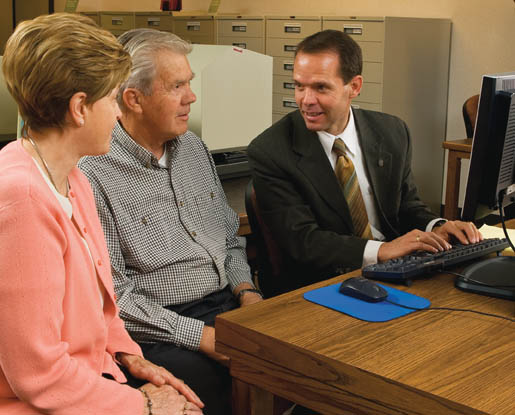 Many people know that the Mormons focus strongly on upholding the traditional family. Many also know that the Mormon Church runs the largest family history library in the world. According to the beliefs of Mormonism, families can be together forever—not only nuclear families, but widely extended families that span generations. Members of the Mormon faith are encouraged to find their ancestors through family history work, so that they may do temple work for those ancestors and be sealed to them in the temple.
Many people know that the Mormons focus strongly on upholding the traditional family. Many also know that the Mormon Church runs the largest family history library in the world. According to the beliefs of Mormonism, families can be together forever—not only nuclear families, but widely extended families that span generations. Members of the Mormon faith are encouraged to find their ancestors through family history work, so that they may do temple work for those ancestors and be sealed to them in the temple.
Two verses in Malachi pertain to the sealing of families:
Behold, I will send you Elijah the prophet before the coming of the great and dreadful day of the LORD:
And he shall turn the heart of the fathers to the children, and the heart of the children to their fathers, lest I come and smite the earth with a curse (Malachi 4:5-6).
Elijah visited Joseph Smith, the founder of the Church, in 1836 on the Jewish holiday of Bikkurim, the second day of Passover, and conferred upon him and the Church the power to seal on earth and in heaven. (Jewish tradition has always held that Elijah would appear just before the Messiah arrives.) The appearance of Elijah to Joseph Smith is recorded in Doctrine and Covenants, section 110:
After this vision had closed, another great and glorious vision burst upon us; for Elijah the prophet, who was taken to heaven without tasting death, stood before us, and said:
Great and wonderful things happen when Latter-day Saints participate in family history work. Finding ones ancestors increases gratitude for the sacrifices they made for future generations. Talents and personality traits can be traced back through time. One’s sense of identity grows, and the eternities become very real, since they are populated by so many loved ones. The Plan of Salvation all becomes more real, and one realizes that loved one who have passed on have an intense interest in us and our dealings on earth. They are the angels who minister to us and lend us support during our sojourn on earth.
The Mormon doctrines about the salvation of the dead may seem strange to those who know little about them. Mormons believe that those who were unable to receive saving ordinances while they lived on earth can choose to receive them after death. Therefore, Mormons will receive these ordinances on the behalf of others who have passed on, by proxy—but to do this, they need to have the names and records of those others. Thus, family history is imperative.
Mormons are not at all stingy with their family history resources. They believe that a knowledge of one’s ancestors is important for anyone and everyone to have. Their history is the history of the living as well.
Beyond the great and massive Family History library in Salt Lake, which represents the work of over a hundred years of record-gathering, the Church offers a website: familysearch.org. Both are available to the public, and the Church encourages their use.
Familysearch.org also allows you to receive data about your ancestors from others, as well as share your own. Perhaps you will find that family history has significance for you and your family. You may well find ancestors and family stories you never knew you had.
Why Mormons perform ordinances for the dead: “Everyone Else Makes such Lonely Heavens”
